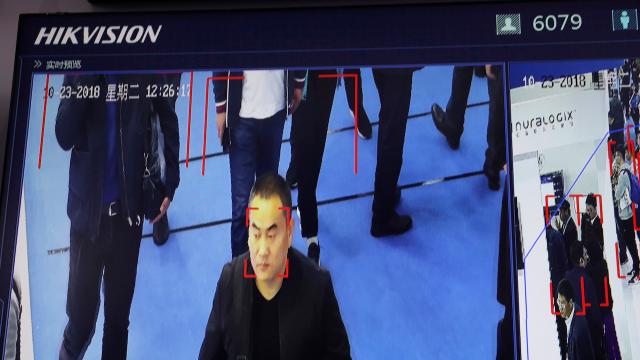The U.S. government is considering a tech export ban that would target Hikvision, a Chinese video surveillance company that’s been instrumental in sending anywhere from 1 million to 3 million Muslims into China’s network of secretive concentration camps, according to a new report from the New York Times.
Under the proposed ban, Hikvision would be unable to buy American technology, not unlike last week’s restrictions placed on Huawei that now prohibit American companies like Intel and Google from doing business with the Chinese tech giant. Hikvision did not immediately return Gizmodo’s request for comment on Wednesday.
The U.S. government ban would in some ways be symbolic, as Hikvision doesn’t import much hardware from the U.S., but it’s not clear whether the company’s American sales would ultimately be affected. Hikvision sells a large assortment of consumer-grade surveillance cameras in the U.S. through online retailers like Amazon, but the video equipment being used in China is much more sophisticated.
Hikvision makes traffic cameras, footpath surveillance cameras with facial recognition, and thermal cameras that are used to monitor people throughout China. The company also makes warehouse conveyor robots, robot forklifts, and drones, as well as drone signal jammers.
The Chinese government has systematically surveilled and oppressed the roughly 11 million Uighurs, an ethnic minority in the western part of the country who are predominantly Muslim. Current estimates indicate that anywhere from 1 million to 3 million Uighurs are currently being held in China’s concentration camps, according to the U.S. State Department.
The Chinese government prefers to call the camps “re-education centres” and denies that Uighurs are being oppressed despite overwhelming evidence to the contrary. China insists that its actions against the Xinjiang region’s Uighurs are an anti-terrorism effort.
In reality, the Xinjiang region has become a total police state, with armoured cars and tanks on the streets in recent years. Western reporters who go to the region are regularly tailed and harassed for reporting on the Uighurs and average citizens are constantly stopped for their ID, so much so that many dread leaving their homes at all.
“Hikvision takes these concerns very seriously and has engaged with the U.S. government regarding all of this since last October,” a Hikvision spokesman told the New York Times via email. “In light of them, the company has already retained human rights expert and former U.S. ambassador Pierre-Richard Prosper to advise the company regarding human rights compliance. Separately, Hikvision takes cybersecurity very seriously as a company and follows all laws and regulations in the markets we operate.”
Pierre-Richard Prosper was President George W. Bush’s Ambassador-at-Large for War Crimes Issues at the U.S. State Department from 2001 to 2005.
United Nations human rights chief Michelle Bachelet has recently called for an investigation into the treatment of the Uighurs in China, but the Chinese government has insisted that any investigation should avoid, “interfering in domestic matters.”
As the New York Times reports, Hikvision already exports its high-end video surveillance technology to countries like Pakistan, Zimbabwe, Uzbekistan, and the United Arab Emirates. And countries like Saudi Arabia have been oddly supportive of the crackdown on China’s Muslim citizens.
But the Trump regime’s interest in banning Hikvision may not be primarily about protecting the Uighurs, as these kinds of actions are seen through the lens of the U.S.-China trade war, as well as the New Cold War more broadly.
“Taking this step would be a tangible signal to both U.S. and foreign companies that the U.S. government is looking carefully at what is happening in Xinjiang and is willing to take action in response,” Jessica Batke, a former State Department official, told the New York Times. “At the same time, however, the ongoing trade war perhaps undercuts the perception that this is coming from a place of purely human rights concerns.”
Roughly 42 per cent of Hikvision is controlled by state-owned companies in China, though American financial institutions like Fidelity and J.P. Morgan are also major investors, according to Foreign Policy magazine. One of J.P. Morgan’s 2017 reports on investments in China noted “strong demand across a wide range of industries” for Hikvision’s products.
As the Financial Times notes this morning, shares in Hikvision plummeted 10 per cent today before slightly recovering. But any further slip in Hikvision’s stock is likely to create the kind of pressure that even the UN can’t bring to bear—wealthy people who are helping finance oppression, knowingly or not, really don’t like losing money.
